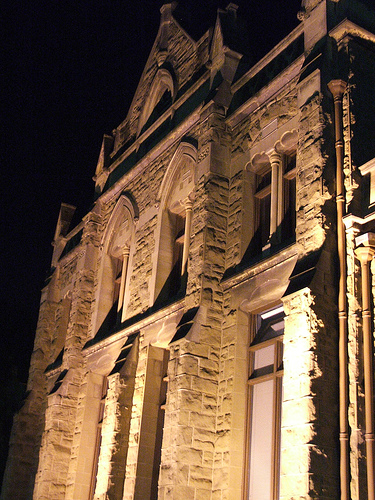Human Research Ethics Online Training
V. Research with Aboriginal and Torres Strait Islander Peoples
The Negative Legacy of Research: The Stolen Generation
Here is an example of how early anthropological research on Australian Indigenous groups led to devastating results for Indigenous communities.
Sir Walter Baldwin Spencer (1860-1929), an early Australian scientist and anthropologist, was a proponent of a theory of racial hierarchy which placed Australian Aborigines into a category that "represent the most backward race extant and, in many respects, reveal to us the conditions under which the early ancestors of the present human races evolved." [1]
As an influential academic, Baldwin Spencer's writings were wide-reaching and had an enormous impact on public perceptions of Indigenous culture. His writings were based on fieldwork, but imbued with the misunderstandings of his generation. These included believing in Darwinian hierarchies and the belief that Indignity is a genetic condition that exists in 'the blood'. Such eugenicist beliefs are still current and have resulted in some of the greatest atrocities in human history including the Holocaust, Pol Pot and Rwanda.
Another belief of this era which is still current in some quarters is that identity is genetic, so "mixed race" Aboriginal and Torres Strait Islander people may inherit some of the "advantages" of their European parent and may be redeemable as more "superior" human beings to their Aboriginal or Torres Strait Islander parent. These children were referred to with what is now considered to be the demeaning term "half-caste."
Bearing these beliefs, Spencer became "Chief Protector of Aborigines" in the Northern Territory from 1911-1913, which made him a strong advocate of the forced removal policies that led to what is known today as the "stolen generation":
"No half-caste children should be allowed to remain in any native camp but they should all be withdrawn and placed on stations. So far as practicable, this plan is now being adopted. In some cases, when the child is very young, it must of necessity be accompanied by its mother, but in other cases, even though it may seem cruel to separate the mother and child, it is better to do so, when the mother is living, as is usually the case, in a native camp." [2]
The impact on Indigenous families and children was devastating. Can you imagine how a parent feels to have his or her children forcibly taken from them? Many of the children who became wards of the state experienced abuse, including physical, sexual, and psychological abuse. According to Reconciliation Australia,
"The Bringing Them Home report found that many children were removed solely on the basis of skin colour. Because of this, siblings from the one family who were considered to be of lighter skin colour would be removed when others were left.
"The suggestion those stolen generations children were better off is untrue on any reasonable assessment of the cases where they were placed in situations of deprivation, neglect and abuse. People who were removed gave evidence to the Inquiry of their mistreatment under State care - this ranged from inadequate food and clothing, to physical, sexual and psychological abuse.
"Almost a quarter of witnesses to the Inquiry who were fostered or adopted reported being physically abused. One in five reported being sexually abused." [1]
The underlying intellectual foundation justifying the policies of forcibly removing Indigenous children from their communities was the 'scientific' racism of social scientists. Think back to the legacy of the Tuskegee syphilis experiment on African Americans. Similarly, is it any wonder that many Aboriginal communities are sceptical or distrustful about the motivations and outcomes of social science research in their communities?
[1] Spencer quoted in Warwick Anderson, The Cultivation of Whiteness: Science, Health and Racial Destiny in Australia (New York: Basic Books, 2003, p201.
[2] Walter Baldwin Spencer, "Preliminary Report on the Aborigines of the Northern Territory" as quoted in National Inquiry into the Separation of Aboriginal and Torres Strait Islander Children from their Families (Australia), Ronald Darling Wilson, and Australia. Human Rights and Equal Opportunity Commission. Bringing Them Home: Report of the National Inquiry into the Separation of Aboriginal and Torres Strait Islander Children from their Families (Sydney: Human Rights and Equal Opportunity Commission, 1997), p 133.
[3] http://www.reconcile.org.au/getsmart/pages/sorry/sorry--faq.php, retrieved 23 December 2008
 Picture of Baldwin Spencer Building at The University of Melbourne.Photo by flipsockgrrl (sneedleflipsock.com), all rights reserved.
Picture of Baldwin Spencer Building at The University of Melbourne.Photo by flipsockgrrl (sneedleflipsock.com), all rights reserved.

